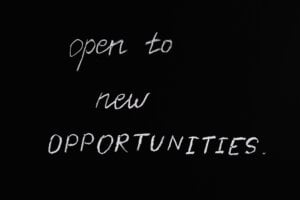Do I mention being unemployed?
For people in freelance careers this may be no big deal. But for anyone used to a full time permanent job it can feel pretty daunting.
I get many CVs of people who’ve “forgotten” to update “2021 to date” to “2021 to June 2023” (for example) or who mysteriously have the same lapse on their LinkedIn profile.
Let’s be honest: the reason is that they think they will be judged negatively because they’ve been “let go” or resigned. In the dim and distant past there might have been a feeling that employers use redundancies as a way of clearing out the poorer performers and “dead wood”. And that therefore it’s a bit shameful to go public with not being employed.
But in 2023 that really is not the case. When you get headlines like “Accenture to axe 19,000 jobs” can anyone seriously think that they had 19,000 deadbeats on the payroll? In the same vein leaving a job before you had another one to go to was thought decidedly suspicious but now is commonplace and rarely merits more than a quick query.
The positives
No one I know and no employers I know have shown any negative reaction to someone between jobs. Quite the reverse.
These applicants are often viewed more positively. Candidates who are unemployed:
- Will be serious about their application
- They will be available for interviews
- Won’t have annoying long notice periods
- May not have “non-compete” clauses.
In fact the only negative for a potential employer might be other competing offers. Albeit even that can be good news as it means that if a candidate takes THEIR offer, it’s because they think it’s the best fit with their job requirements and career ambitions.
So the good news is you can and should be up front and positive about your availability for a new challenge!
Interview tips
For someone with a permanent career path, an interview “between jobs” can be more stressful than usual. There is no reason to be defensive or concerned about being unemployed: you might be their ideal hire!
The overall message is keep it simple. Don’t “over explain” why you are out of work or make it a bigger deal than it needs to be. Remember the future employer is mainly seeking reassurance that you will be both successful and happy with them. No more and no less.
The second key point is don’t lie (at some point you will be found out). However, you are allowed to put a positive take on things.
Context
- Circumstances can be important so if you were one of several people made redundant then say so.
- While you should avoid negative comment it’s fine to make clear any employer’s operational or financial difficulties that contributed to your departure, voluntary or otherwise.
- If it was about you, and being “let go” actually means fired, then employers may be sympathetic to carefully positioned reasons. If for example you were not achieving sales targets and the reason was being recruited to open a new market, but the firm was reluctant to invest in building this business.
Your previous employer
Traditionally being negative about an employer reflected badly on the applicant. That is much less true now, but it can still be poorly received so take care. If there was a bad or “toxic” culture, which made you decide to leave, then say so BUT back it up with evidence e.g. high attrition, previous incumbents having left, poor Glassdoor reviews etc.
Citing “work life balance” also used to be a no-go area, especially for management consultants, but is much more acceptable now. Again be careful with context and be explicit about the problem. If you were working very long hours, or weekends, or M-F away from home, and that was the reason for leaving, then say so. Any employer who wants you to do the same won’t hire you. A lucky escape!
If the role, structure, sponsor, strategy or other aspects changed these are frequent and entirely plausible reasons for either a forced or voluntary move so don’t be afraid to say so.
Similarly if the role was part of a major programme which came to an end.
Looking forward
Think carefully about what attracts you to the employer and the role you are interviewing for. How does it fit with your goals and career plan? Make sure the interviewer is aware of this. No employer will want to think you are interested only because you need a job.
Finally make sure the employer is aware of the upsides. What did you gain from the experience? The reflections and learning points? What might you do differently next time? This is especially important if you are unemployed because you were dismissed (see ‘Context’ above)
What do I do about a gap in my employment?
You may be concerned about a gap for many reasons, including worry about how it might be viewed.
A period between one job and another is entirely normal.
In terms of CV, LinkedIn and interviews:
- explaining 0-3 months since leaving your last employer doesn’t require a moment’s thought;
- 3-6 months may require a bit of “filler” (see below);
- 6-12 months requires a clearer narrative and explanation;
- 12 months or more ideally should be framed (if possible) as voluntary, reflecting a conscious choice (see below).
As stressed earlier I am not suggesting dishonesty. But like many aspects of your professional life you need to be able to present matters in a positive manner. A “cup half full rather than half empty”.
While it’s never too late you should ideally give this some thought soon after leaving your last employer. Using the logic “hope for the best but prepare for the worst”.
Key points:
- You don’t have to be specific on the CV or LinkedIn regarding the month when you left your last employer. It is entirely fine for a CV to read “2019 to 2023” rather than for example January 2019 to February 2023”. This is true of LinkedIn too. Of course when asked at interview you should be clear and transparent about dates i.e. the date you contractually finished employment: vagueness or inconsistency will not go down well and will be picked up at reference checking.
- Don’t however leave an obvious or long gap without any explanation. If your last role finished the previous year and/or over 12 months ago what you have been doing in the time since needs some clarification.
- Consider how to fill any gap in a manner that reflects well at interview. Unless you have spent months in a dark room applying for jobs this may be easier than you expect. Depending upon the length of time this might include: interim & freelance work; courses; travel; spending time with the family; home improvement projects; a sabbatical or career break; volunteering or charity work; pursuing a passion/hobby/interest; a period reflecting on next career steps.
- While it might seem unfair, best avoided is detail about family/health/financial traumas. Apart from the obvious headline of “too much information” the main reason is the potential employer’s worry that these might reappear in future and affect your ability to do the job, or might mean you leave.
In summary
Although being “between jobs” (use your own preferred euphemism for unemployed) can be an uncertain and stressful time for some people for many it can be a great opportunity. It certainly need not affect your prospects of getting a great job.
For more information on how Prism Executive Recruitment could help you with your candidate hunt or job search you can contact Chris Sale (Managing Director) via Contact Us on 01344 636426 or [email protected]




